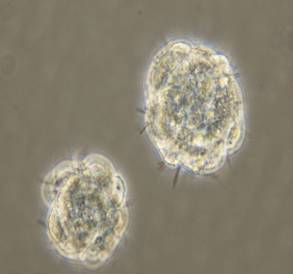
Ateneo Pontificio Regina Apostolorum
Institute of Science and Faith
UNESCO Chair in Bioethics and Human Rights
Neurobioethica Study and Research Group
Treating neurological diseases while respecting human life:
for an ethical use of stem cells

Third Interdisciplinary Seminar of the Neurobioethica Study and Research Group
Rome, Friday December 3rd, 2010, 4.00pm – 6:30pm
Free Admission, Simultaneous Translation
Introduction
Stem cells may one day cure severe degenerative diseases of the Central Nervous System such as Alzheimer’s Disease and Huntington’s Chorea. This new therapy is known as Regenerative Medicine where old or dying cells are replaced by young ones. Stem cells have different origins, although they have the same degree of pluripotency (that is they can transform themselves from progenitor cells into differentiated cells, the latter being found in various tissues). Stem cells can be obtained from the human embryos, adult tissues and cord blood or through the process of cloning. Finally, stem cells can be obtained by the reprogramming of adult cells (iPS). There are ethical implications involved in these choices, since stem cells obtained from an embryo imply the destruction of human life.
This third interdisciplinary seminar of the Neurobioethica Consortium addresses the research, production and use of stem cells in the treatment of neurological diseases. It aims to reaffirm the urgent need to defend and protect human life at its very early stage through an open dialogue between the empirical sciences and philosophical, ethical and juridical reflections. In addition, this seminar represents a unique opportunity to find and define new modalities for the integration of knowledge and its applications by fostering a holistic vision of the human embryo in contrast with a reductive interpretation (the embryo as “a clump of cells”) which carries with it significant ethical implications and practical consequences.
“However, new biomedical technologies which have been introduced in the critical area of human life and the family have given rise to further questions, in particular in the field of research on human embryos, the use of stem cells for therapeutic purposes, as well as in other areas of experimental medicine. These new questions require answers”. Dignitas Personae, Introduction, 2008.
In collaboration with:
- STOQ (Science Theology and the Ontological Quest)
- The John Templeton Foundation
- School of Philosophy
- School of Bioethics
Program
16:00 Welcome and opening remarks from the President of the Ateneo Pontificio Regina Apostolorum, Prof. Pedro Barrajon, L.C.
16:15 Opening address Maria Addolorata Mangione MD, PhD in Bioethics, Neurobioethica Study and Research Group, Ateneo Pontificio Regina Apostolorum
16:30 Stem Cells: Discovery, Classification and Application in Pharmaceutical Research and Regenerative Medicine Giovanni Gaviraghi C.E.O, Siena Biotech, S.p.A., Monte dei Paschi di Siena Foundation
17:00 Stem Cell and Restorative Therapy for CNS Disease Martin M. Bednar Executive Director and Global Clinical Lead for Neuro-Recovery/Regenerative Medicine and Alzheimer’s Disease Modification Projects, Pfizer Worldwide Development
17:30 Stem Cells: Ethical Dilemmas Gonzalo Miranda Full Professor, School of Bioethics, Ateneo Pontificio Regina Apostolorum
18:00 Vulnerable Brains, Vulnerable Cells? Human Rights and Stem Cells Research Alberto García Full Professor, School of Bioethics, Ateneo Pontificio Regina Apostolorum and Director, UNESCO Chair of Bioethics and Human Rights
18:30 Discussion, refreshments and conclusion of the workshop
Ateneo Pontificio Regina Apostolorum
Via degli Aldobrandeschi, 190
00163 Roma
Telephone: 06 66543854/06 66543934
Fax: 06 66527840
